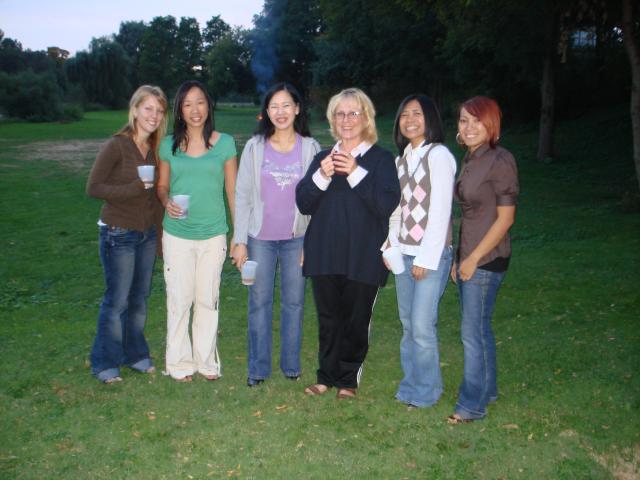This past Tuesday, I had jury duty. I thought I would write up a bit about my experience just for the sake of curiousity. This is also for anyone who might be called for jury duty in London, Ontario in the future, if they want to know what they're getting into.
I arrived at the court house in downtown London at about 8:45 am for the 9:00 am session. Parking is something like $13.00 if you park at the courthouse, it's $7.00 about a block away and it's only $4.50 if you go three blocks south at the corner of King Street and Ridout. Yes, I chose the best parking spot and I got to brag about it a few times as everyone else complained about the price.
It's a good thing I arrived early at the courthouse. There was a long line of people waiting to go through the security checkin. We had to take everything out of our pockets, our bags were inspected and we had to go through a metal detector. Make sure you have extra time for that. Oh, and make sure you don't bring a drink in with you because it will get confiscated.
Once in, I took the elevator to the 14th floor. It's technically the 13th floor but such floors do not exist in some large buildings. This is where the main courtroom was situated for jury selections. I had my jury duty letter and I had to tear off the bottom portion, sign it and hand it in before I was admitted into the courtroom.
The courtroom seats about 200 spectators, just barely. On this day, we actually had two jury pools of 100 people each. The pool from the previous week had been cancelled and it was deferred to this week with my pool. At around 9:30 am, a lawyer-or-somebody-official came out and informed us that we would have two jury selections, one in the morning and one in the afternoon with a 1.5 hour break for lunch.
The lawyer-or-somebody-official then proceeded with rollcall. He went through two giant stacks of computer-generated cards, verifying that everyone was present. He worked hard to keep things lively, cracking jokes and referencing old names and businesses that he knew. At one point, he asked if one lady knew of so-and-so. The lady answered yes, that was her sister. And the lawyer-or-other responded and said that he had been married to that sister, much to the woman's surprise! Small world...
The lawyer-or-other also used this time to clarify the occupation of each person. Something like "manager" or "sales" had to be made more specific. As an example, he said that defense lawyers in a trial for a bank robbery may not want a bank manager in the jury. And while in civil cases a jury might be random, in this criminal case the lawyers had a finite number of vetoes regarding jury selection.
By coincidence, one of my friends happened to be in this jury pool with me and he sat down just two seats behind me. Nick Hourd had been in the pool for the previous week and now he was joining me in this selection. Interesting occurence, considering that I was hanging out with him the previous Friday. So later on, we got the chance to sit together and quietly crack jokes like those
two guys on The Muppet Show.
At around 10:30 pm, the judge and the lawyers and the court officials and the cops and the defendant all came into the courtroom. "All rise...something, something...Queen and Britain...please sit down." Then they read the charges in this first case against the defendant. There were two charges, one for 2nd degree murder and one for arson. Based on that, it would seem that this guy was accused of lighting a house on fire on June 1 2006, thereby killing a woman that had been inside. The defendant then gave his plea for each charge, pleading guilty for the fire thing and not guilty for the worse thing.
After that, they stuck all of the jury cards into a big bingo spinner and mixed 'em all up. They pulled out twenty cards and had everyone come up one at a time as their name was called. After four or five people were lined up at the front, the judge explained (for a second time) that they were supposed to talk to the judge as they came forward if they had any good reason to be excluded from jury duty. Immediately, most of the people that were lined up stepped forward and gave some excuse and they were excused, leaving just one person standing there.
They gradually called more and more people up until they had 20 people in line that were willing and able to do jury duty. The excuses that people had for exclusion were sometimes quite amusing. A few examples...
- One lady announced that she was turning 100 next year and preferred not to participate.
- Another lady's occupation was announced as "maternity leave." 'Nuff said.
- One guy said he had cancer was starting chemo and the judge was this close to making him stay anyway.
- A couple of people said that they recognized the accused or one of the lawyers or witnesses involved.
- There was one priest that was excused on religious grounds.
- A lot of people said they had business trips that were absolutely required, and some simply offered the fact that they couldn't afford the time off.
- One guy offered the poor excused of being important at work and not wanting to burden his co-workers. He was let off but then the judge gave everyone a lecture about how she realized that this was a burden to everyone but each potential juror had to prove that it was an "undue burden" if they wanted to the be excused.
Other than that, the minimum requirements for a juror are that:
- They can understand english very well - not just conversational english since a court case is intricate.
- They are a legal citizen of Canada.
- They have adequate hearing abilities.
- In this case, that they are available for approximately three weeks.
Once the line up of twenty potential jurors was set, each person was brought forward one at a time and they were told to look at the accused, and the accused was to look at them. Because this was a criminal case, the lawyers on each side had veto power to dismiss 12 potential people. The lawyers alternated, giving each side a chance to say "Content" or "Challenge" for each person. The lawyers took notes of each person and their occupation and it was an interesting little game of strategy. In the end, the jury seemed to be made of mostly of people that were 40 years old or older, with a few more men than women. It seemed to me the the lawyers were looking for people that seemed dispassionate and logical but that's just my opinion.
In the first set of names, about 40 people were called up and 20 or so were excused. Of these 20, only six were actually admitted to jury duty. After that, they gathered another line up of 10 people, then again a group of 5, and then another group of 5. So there were probably 100 or so names called in all form the jury pool to create a 12-member jury with two additional alternate members.
Once a jury member was agreed upon, they had the choice of swearing in or affirming. By swearing in, they held a Christian Bible and swore to uphold justice so help them God, or something like that. By affirming, the juror just had to promise real hard. Of the 14 jurors selected, only one man opted for affirmation. He was an awkward little asian guy that had trouble understanding the difference between affirming and swearing in. In the end, he simply said that he wanted to "stay away from the Bible," which I found quite amusing. I also thought that most of the people swearing by God was a little funny since I doubt that all 13 of those jurors were actually Christian.
So that was the end of that. All of the court-like people vacated the place and then the jury pool just sat around for another hour or so. We had the option of leaving at any time to go to the bathroom or to get a drink of water. And as the one lawyer-or-other guy said, the final jury members are "treated like gold" and they can get whatever they want, whether it's a bathroom break or a sandwich.
Time dragged on and it was well after 1:00 pm when somebody came back into the courtroom to announce that everyone could go home. We had been waiting to find out how long the lunch break was going to be but then the second courtcase was settled out of court around noon and they cancelled the whole thing. So we got out early, albeit quite hungry, and then Nick and I went out for a long and relaxing lunch.
All in all, 'twas a fascinating day. And this seemed like a fairly big trial with a lot at stake so that added to it all. Very serious stuff but I really enjoyed the experience.













